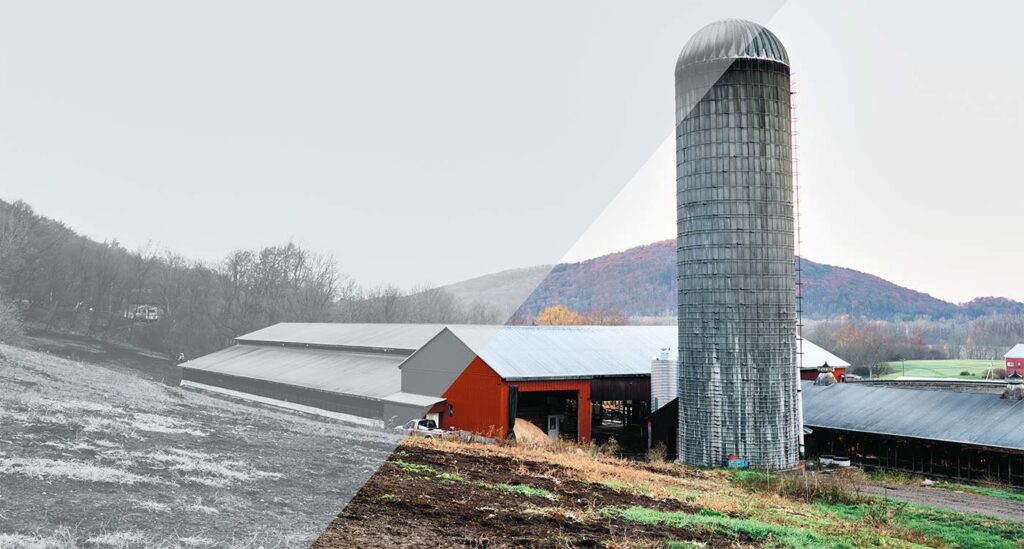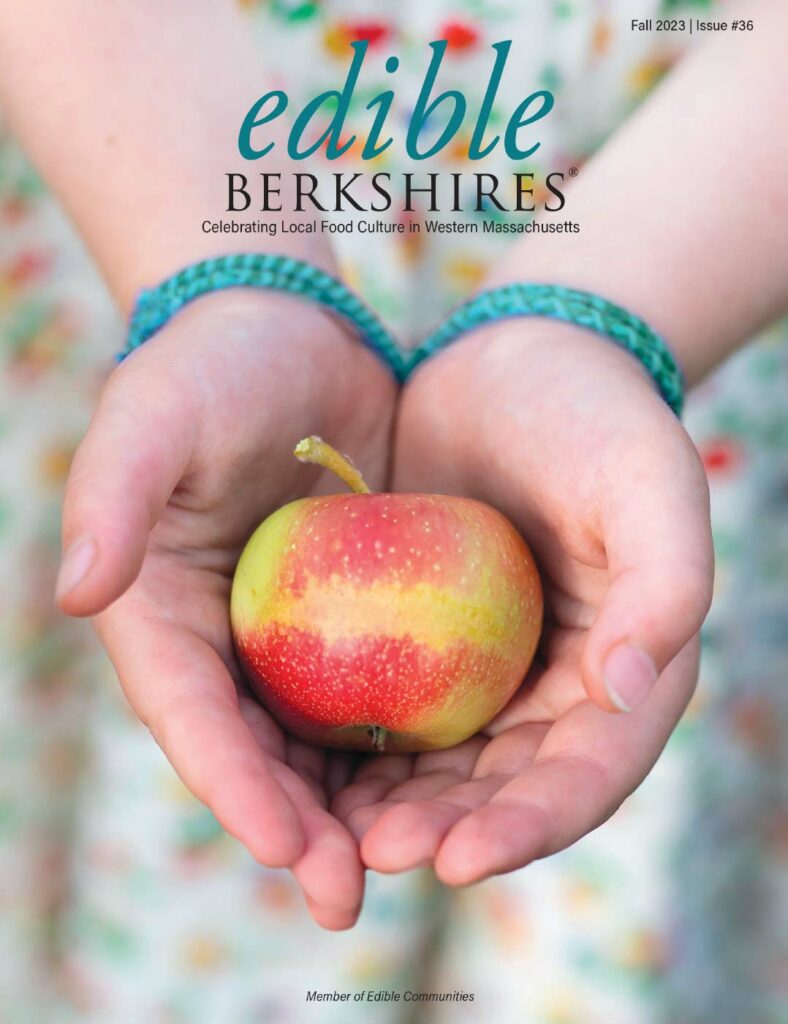
PHOTOGRAPH BY MICHAEL PIAZZA
Early summer is usually a joyful season in Massachusetts as the first fresh, local vegetables appear in markets. But this summer’s start looks to be stormy. Cuts by the U.S. Department of Agriculture are making the near future bleaker for the food insecure in Massachusetts and those involved in aiding them, for children whose nutrition depends on healthy school breakfasts and lunches— and for Massachusetts farmers.
That’s because in early March, U.S. Secretary of Agriculture Brooke Rollins canceled two programs—Local Food Purchase Assistance Cooperative Agreement (LFPA) and Local Food for Schools (LFS)—that provided funds to supply local farm products to food pantries and to schools, more than $1 billion nationwide. That meant not only the loss of nutritious fruits, vegetables, and meats for those in need and for schoolchildren, but also, loss of a stable market for small- and medium-size farms. Her rationale? “…it was non-essential,” she said, declaring the funds “an effort by the left to continue spending taxpayer dollars that were not necessary.”
Under the USDA funding, which was channeled through the states, organizations such as Berkshire Grown, Boston Area Gleaners, Food for Free, Community Involved in Sustaining Agriculture, the Greater Boston Food Bank, and other nonprofits, contracted with Massachusetts farmers or helped facilitate getting fresh, locally grown produce, eggs, and meats to food pantries and to local schools. The programs, set to end completely in late May, have been called a success, a way to both help those who need food and those who grow it. But these cuts, along with cancellations of conservation and climate-smart programs implemented during the Biden administration, are “one impact after another for farmers,” says Ashley Randle, Massachusetts Commissioner of Agricultural Resources, adding: “How many can we take?” State House Rep. Leigh Davis of the 3rd Berkshire District calls LFPA “integral to our community,” and she fears the loss of a program that worked “reliably and consistently” will be devastating for farmers and for agencies working with the food insecure.
USDA’s reasoning doesn’t resonate with Usha Thakrar, executive director of Boston Area Gleaners, which among other services helps match farmers to food aid agencies such as the Greater Boston Food Bank. “The whole thing is terrible,” she says, adding that food insecurity now in Massachusetts is worse than at the height of the pandemic; it is estimated that one in three residents in the state are food insecure. She points out that in two rounds of LFPA funding, $1.2 million worth of food from the Boston Area Gleaners came from 50 farms and resulted in 900,000 pounds of local food going to pantries and other organizations.
To farmers like Harrison Bardwell, who farms 50 acres of vegetables in the Connecticut River Valley, the cuts are devastating. He had already finished planning for the upcoming season and bought seed and fertilizers after verbal commitments that his crops would be purchased to supply food pantries and other nonprofits under the USDA programs. In 2024, that meant $250,000 in revenue, a big part of the farming strategy for this 28-year-old who is reviving farmland that has been in his family for nine generations.
TIGHT BUDGETS GET TIGHTER
It’s been a spring of uncertainty for many, from the Berkshires to Boston. Robyn Burns of the Salem Pantry says there has been both less variety and less fresh food coming from the Greater Boston Food Bank, where most of the pantry’s food originates, as well as cuts in USDA food contributions. “We’re seeing an increase of people coming to the pantry,” she says, crediting fears of looming SNAP and Medicaid cuts. The impact of the funding cuts on farmers will also affect the pantry, since their summer harvests typically make the seasonal offerings more nutritious and varied.
At Great Barrington’s People’s Pantry, demand for food has remained high since the pandemic, says Laura Gratz, board president, just as the USDA cuts threaten supply. The pantry serves 250 families, or about 3,000 people a month, she says, with nonperishable items such as rice, canned goods, and peanut butter sourced from the Food Bank of Western Massachusetts in Chicopee. As with other food pantries and nonprofits, some food comes from grocery stores and other food outlets and is supplemented with perishables and produce bought with financial donations. But the USDA cuts are “causing all sorts of nightmares up and down” the line. “Everyone in food insecurity is trying to figure out how to do this [with cuts] and demand going up.”
Having fresh, local food for those in need “does save on health care,” says Margaret Moulton, executive director of Berkshire Grown, which served 25 food access sites in 2024 by purchasing from 31 Massachusetts farms. “The truth is that fresh food is more nutritious,” she adds. The LFPA program was a “huge boon” to farmers, she says, giving them markets they could count on as they planned for the year. Berkshire Grown had promises from farmers who were already scaling up their production of eggs and vegetables. Although there is advocacy for reinstating the funds that have been cut, there is no indication that this will happen. “The state is amazing,” she says, “but it’s a tight budget year,” adding that state help and private donations can’t touch the amount the federal government was providing.
The pressures on the state budget are rising, too. The state assistance through the Healthy Incentives Program (HIP), which matched SNAP dollars to buy fruits and vegetables at farmers markets and stands, has been cut in half this year. The shrinking funds for HIP will impact both SNAP recipients and farmers who sell through HIP at the same time that the LFPA cuts will be felt.
“The HIP cuts had a big impact on us,” says Dominique Frink at Lion’s Tooth Farm in Windsor. “We purchased an additional 30 acres because we were doing so well. But right after the purchase, there were HIP cuts and now we have less of an outlet for the produce we’re growing.” She noticed far fewer customers at the indoor winter farmers markets. “People who receive HIP and SNAP told me it’s not worth it for them to come to farmers markets anymore,” she says.
“The HIP cuts had a big impact on us,” says Dominique Frink at Lion’s Tooth Farm in Windsor. “We purchased an additional 30 acres because we were doing so well. But right after the purchase, there were HIP cuts and now we have less of an outlet for the produce we’re growing.”
CANCELED FUNDING, UNCERTAIN SURVIVAL
When the LFPA and LFS programs began in 2022, matching people in need and school food programs with small- and medium-size farms seemed both forward thinking and sensible economics. The programs were nationwide, but in Massachusetts, where most farms are small compared to large commodity acreage in the Midwest and elsewhere, it meant farmers could be assured of a stable market. Under the Biden administration, the program was renewed in December 2024; now some of that funding has already stopped.
South Deerfield–based Community Involved in Sustaining Agriculture, which helps farmers with everything from marketing to technical workshops, works with “a lot of farmers who were counting on the LFPA program,” says Claire Morenon, the nonprofit’s communications manager. But that hasn’t been the only blow under the Trump administration. The USDA in early spring announced the cancellation of $3 billion for climate-farming projects because the program “did not align with the priorities of the Trump administration.”
One farmer affected is Ryan Voiland of Red Fire Farm in Granby, who had a $125,000 contract with the USDA for a solar project that could make his vegetable farm more sustainable by cutting his energy costs. “It would have been a really good thing for us,” he says.
Voiland is part of an Earthjustice lawsuit against the USDA over the canceling of contracts that were funded by Congress under Biden’s Inflation Reduction Act. For Voiland, as well as others, the turmoil is making a difficult farming situation worse. With the rapid rise in seed, labor, and other costs and the fact that the “produce market struggles to find good customers,” he says, his farm is facing a challenging financial future. He says he’s “trying hard to figure out how not to give up.”
Commissioner Randle of the Massachusetts Department of Agricultural Resources (MDAR) echoes the concerns for farmers and the food insecure. The USDA cuts “impact farms’ overall ability to survive,” she says, when climate pressures and market challenges already make farming risky. The added number of those facing food insecurity is “what keeps me up at night.” The LFPA and LFS programs were termed a success across the board, Randle says, making the cuts “disappointing.” This, added to the termination of $3.4 million in funds for emergency food assistance for food banks and other cuts, has created a “cascading impact across the local food system.”
Although the state and the MDAR are working to find ways to support both the food insecure and the commonwealth’s farmers, “there won’t be a way to fill all those gaps,” Randle says. Burns of Salem Pantry, Gratz of People’s Pantry, and many other nonprofits say they’re reaching out to private donors, who have been generous. But all acknowledge the blow of losing federal funding and grants.
As Burns says: “It would be naïve to think that [private donations] can fill the gap. And it wouldn’t be sustainable year after year.”
This story was produced in partnership with our colleagues at Edible Boston.







